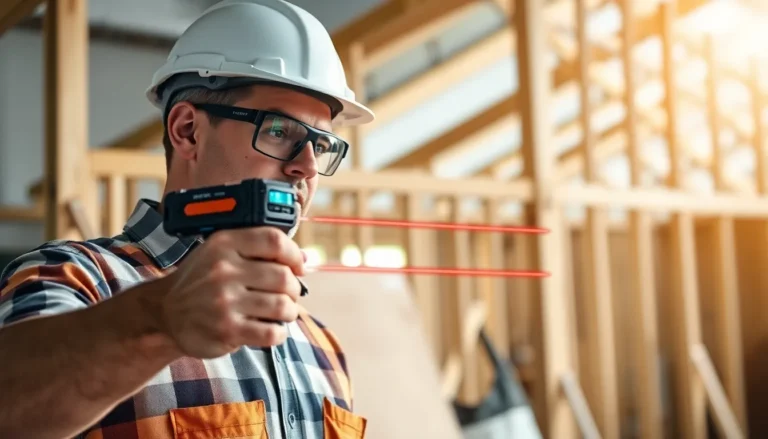Table of Contents
ToggleImagine walking into your home and having it greet you like an overly enthusiastic puppy. That’s the magic of smart home tech. From voice-activated assistants that can dim your lights to smart fridges that remind you when you’re out of milk, these gadgets are transforming everyday living into a sci-fi experience.
Overview of Smart Home Technology
Smart home technology refers to devices that enhance home automation and improve daily living through connectivity and control. Common components include smart speakers, smart thermostats, and security systems that communicate with users and each other. Many households adopt voice-activated assistants, like Amazon Alexa or Google Assistant, to streamline tasks, such as adjusting lighting or playing music.
Security systems also benefit from smart technology, enabling homeowners to monitor their property remotely through smartphones. Smart locks provide keyless entry options and improve access control, enhancing convenience and safety. Furthermore, smart appliances, including refrigerators, ovens, and laundry machines, offer innovative capabilities such as remote monitoring and energy management.
Enhanced energy efficiency ranks among the top benefits of smart home technology. Statistically, homes equipped with smart devices can reduce energy consumption by up to 30%. Energy-efficient solutions often include smart thermostats that learn user preferences and adjust heating and cooling accordingly.
In addition to convenience and efficiency, smart home tech fosters enhanced communication. Many devices send real-time notifications to users regarding home status and alerts. Notifications from smart smoke detectors or water leak sensors help ensure safety and prompt response to emergencies.
Overall, smart home technology signifies a shift towards more responsive and intuitive living environments. As technology advances, the integration of artificial intelligence and machine learning in smart home devices will likely increase, further transforming how people interact with their living spaces.
Top Smart Home Devices
Smart home devices enhance convenience and efficiency. Their integration into daily routines offers seamless control over various household functions.
Smart Speakers
Smart speakers serve as the central hub for voice-activated systems. Devices like Amazon Echo and Google Nest allow users to play music, set reminders, and control other smart devices. Integration with voice assistants streamlines interactions, making tasks like adjusting lights and checking weather simpler. In addition, smart speakers can answer questions, providing effortless access to information. Their multi-functional capabilities make them essential for a smart home setup.
Smart Thermostats
Smart thermostats improve energy efficiency significantly. Models such as Nest Learning Thermostat and Ecobee SmartThermostat offer intelligent scheduling based on user behavior, adjusting temperatures automatically. Users can control settings remotely via mobile apps, ensuring optimal comfort and energy savings throughout the day. Data analytics from these devices provide insights into energy usage patterns, helping users make informed decisions. Efficient management of heating and cooling can lead to energy savings of up to 30%.
Smart Security Systems
Smart security systems revolutionize home monitoring. Equipment like Ring Video Doorbell and Arlo Security Cameras allows users to view real-time video feeds from anywhere. Motion detection features send alerts directly to users’ smartphones, enabling quick responses to potential threats. Integration with smart speakers and other devices enhances the overall security experience. Home automation is complete with smart locks and lighting that offer an extra layer of protection and peace of mind.
Advantages of Smart Home Tech
Smart home technology offers numerous advantages that enhance daily life.
Increased Convenience
Automation simplifies everyday tasks. Voice-activated assistants perform functions such as controlling lights and adjusting thermostats with a simple command. Smart appliances send alerts to users, reminding them of essential activities like grocery shopping or maintenance needs. Remote access allows users to monitor their homes from anywhere, eliminating worries about forgetting to lock doors or turn off lights. These conveniences save time and reduce stress while promoting effortless living.
Energy Efficiency
Energy consumption decreases significantly with smart home devices. Homes equipped with smart thermostats optimize heating and cooling based on usage patterns, resulting in energy savings of up to 30%. Smart lighting systems automatically adjust brightness based on time of day or occupancy, contributing to lower electricity bills. Real-time energy monitoring apps provide insights into usage, enabling users to make informed decisions that further enhance efficiency. This proactive energy management not only cuts costs but also supports sustainability efforts.
Enhanced Security
Security features become more robust with smart home tech. Advanced smart security systems include video doorbells and motion-activated cameras that allow real-time monitoring of properties. Alerts sent directly to smartphones keep homeowners informed of any suspicious activity, enhancing overall safety. Integration with smart locks adds another layer of protection, enabling remote locking and unlocking capabilities. These enhanced security measures provide peace of mind, ensuring homes remain safe and secure.
Popular Brands in Smart Home Tech
Smart home technology features several leading brands that provide devices enhancing home automation. Each brand offers unique strengths, ensuring users find solutions that fit their needs.
Amazon Alexa
Amazon Alexa acts as a central hub for various smart home devices. Voice commands allow users to control lights, thermostats, and security systems effortlessly. With thousands of compatible devices, Alexa ensures flexibility and customization for individual lifestyles. The Alexa app provides user-friendly interfaces, allowing remote access and management. Regular updates like new skills expand its capabilities continually, making it a top choice for smart home enthusiasts.
Google Home
Google Home integrates seamlessly into daily routines through its smart speaker ecosystem. Voice commands enable users to manage schedules, control entertainment systems, and adjust smart appliances. Its compatibility with multiple platforms ensures users can access a wide variety of devices. Search engine capabilities allow users to obtain information quickly, enhancing interaction. Routine features let users automate daily tasks, providing a personalized experience.
Apple HomeKit
Apple HomeKit delivers a secure environment for smart home management. Users can control their devices through the Home app on iOS devices. Emphasis on privacy and encryption attracts users concerned with data security. Siri voice commands streamline actions, improving ease of use. The ecosystem includes numerous compatible devices, enhancing interoperability across various manufacturers. Regular updates maintain functionality and introduce new features, keeping users engaged with evolving technology.
Smart home technology is reshaping how people interact with their living spaces. With devices that enhance convenience security and energy efficiency it’s clear that these innovations are more than just trends. They provide tangible benefits that improve daily life and contribute to a sustainable future.
As technology continues to evolve the potential for even smarter homes grows. Homeowners can look forward to a future where automation and connectivity make their lives easier and more secure. Embracing smart home solutions today means stepping into a world of possibilities that redefine modern living.







